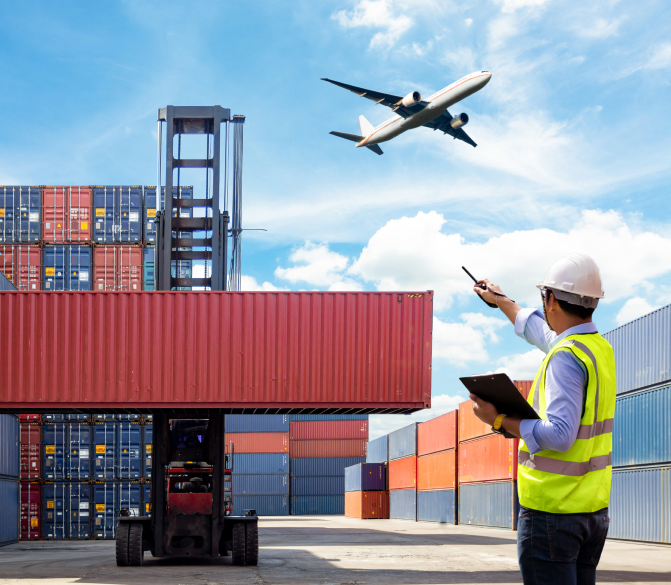Luft transport spiller en afgørende rolle i moderne forsyningskæder. Den sikrer, at varerne hurtigt og effektivt når frem til deres destination. Du får gavn af dets evne til at forbinde globale markeder, hvilket gør det muligt for industrierne at trives. Denne transportform hjælper virksomhederne med at imødekomme forbrugernes krav om hurtige leverancer. Den har en ubestridelig indvirkning på den globale handel.
De unikke fordele ved lufttransport
Lufttransport er et uovertruffen redskab til transport af varer. Du kan stole på, at den leverer produkter på tværs af kontinenter på timer i stedet for dage. Det gør den til det ideelle valg til tidsfølsomme forsendelser som medicinsk forsyning, letfordærvelige varer eller højværdi elektronik. I modsætning til andre transportformer minimerer lufttransport forsinkelser som følge af trafik eller geografiske barrierer. Det sikrer, at dine varer når deres destination til tiden, og at din forsyningskæde fungerer gnidningsløst. I dagens hurtige verden kræver forbrugerne kortere leveringstider. Lufttransport hjælper dig med at forblive konkurrencedygtig ved effektivt at imødekomme disse krav.
Lufttransport giver fleksibilitet i ruteplanlægningen, hvilket tillader dig at tilpasse dig til ændrede omstændigheder. Flyselskaber kan justere flyveruter for at undgå forstyrrelser som dårligt vejr eller politisk uro. Dette sikrer, at dine varer fortsætter med at bevæge sig, selv når udfordringer opstår. Lufthavne fungerer også som nøglehubs for multimodal integration. Du kan kombinere lufttransport med vej-, jernbane- eller søfragt for at skabe problemfri logistikløsninger. Denne fleksibilitet giver dig mulighed for at optimere omkostninger og leveringstider. For eksempel kan du bruge lufttransport til den langdistancerede del af en sending og lastbiler til sidste miles levering.
Lufttransport spiller en afgørende rolle i just-in-time-systemer og lean-produktionssystemer. Disse systemer er baseret på præcise tidspunkter for at reducere lageromkostninger og spild. Med lufttransport kan man modtage råvarer eller komponenter, når man har brug for dem. Dette minimerer lagerbehovet og holder produktionslinjen effektiv. Ved at bruge lufttransport kan du reagere hurtigt på ændringer i efterspørgslen. Hvis der pludselig opstår en stor stigning i ordrer, sikrer luftfragt, at du uden forsinkelser kan genopbygge lagerbeholdningen. Denne smidighed hjælper dig med at bevare kundetilfredsheden og undgå produktionsnedbrud.
Forbedring af forsyningskædens modstandsdygtighed
Indsats af alternative metoder til at løse problemer
Leveringskæder bliver ofte forstyrret af naturkatastrofer, politisk ustabilitet eller uventede begivenheder. De kan stole på lufttransporten for at løse disse udfordringer ved at tilbyde alternative ruter. Flyvninger kan hurtigt justere flyvebaner for at omgå de berørte områder, hvilket sikrer, at din vare fortsætter med at bevæge sig. Denne tilpasningsevne minimerer forsinkelser og holder din drift på rette spor.
Hvis en stor søhavn f.eks. er overbelastet, er luftfragt et hurtigere alternativ. Du kan omdirigere forsendelser gennem forskellige lufthavne, undgår flaskehalse. Denne fleksibilitet sikrer, at forsyningskæden forbliver robust, selv i uforudsigelige situationer.
Sikring af kontinuitet under kriser
Under globale kriser, såsom pandemier eller humanitære nødsituationer, bliver lufttransport en livslinje. Det sikrer levering af essentielle varer som medicinsk forsyning, vacciner og mad. Du kan stole på dens hastighed og pålidelighed for at opretholde forsyningskædens kontinuitet, når andre transportformer har begrænsninger.
Lufttransport støtter også industrier under økonomiske nedturer. Ved at muliggøre hurtig varebevægelse hjælper den virksomhederne med at tilpasse sig skiftende forhold. Dette sikrer, at du kan imødekomme kundernes behov, selv i vanskelige tider.
Tilpasning til de skiftende markedskrav
Markedets krav ændrer sig hurtigt, især i dagens hurtige verden. Lufttransport gør det muligt at reagere hurtigt på skiftene. Uanset om man skal oplagre lagerbeholdningen eller levere nye produkter, sikrer luftfragt sig rettidig levering.
Du kan også bruge lufttransport til at komme ind på nye markeder. Det forbinder dig med globale destinationer, herunder fjerntliggende områder. Dette udvider din rækkevidde og hjælper dig med at forblive konkurrencedygtig på et dynamisk marked. Ved at benytte luftfragt kan du tilpasse dig kundernes forventninger og gribe nye muligheder.
Lufttransportens rolle i den globale handel
Lufttransport spiller en central rolle i udviklingen af international handel. Det giver dig mulighed for hurtigt at flytte varer mellem lande, hvilket reducerer transittiden og sikrer, at produkterne når verdensmarkederne effektivt. Denne hastighed understøtter industrier, der er afhængige af eksport af varer af høj værdi eller tidskrævende værdi, såsom elektronik, lægemidler og mode. Ved at benytte lufttransport kan du udvide din virksomheds rækkevidde og udnytte nye markeder. Det skaber arbejdspladser inden for luftfart, logistik og beslægtede industrier. Lufthavne og luftfartsselskaber bidrager til den lokale økonomi ved at generere indtægter og fremme erhvervslivets vækst. Når man er afhængig af lufttransport, flytter man ikke kun varer, man støtter den globale økonomiske udvikling.
E-handel trives på grund af hurtig og pålidelig levering. Lufttransport sikrer, at du kan opfylde kundernes forventninger til hurtig forsendelse, selv over landegrænser. Det forbinder dig med internationale købere og sælgere, hvilket gør grænseoverskridende handel problemfri.
Lufttransport overbruger kløften mellem fjerntliggende områder og verdensmarkeder. Den forbinder dig med regioner, der ikke har adgang til andre transportformer, f.eks. øer eller lande uden indlandsfart. Denne forbindelse sikrer, at selv de mest isolerede samfund kan modtage essentielle varer som mad, medicin og teknologi.
Konklusion
Lufttransport er fortsat afgørende for de globale forsyningskæder. Det sikrer hurtig levering, understøtter modstandsdygtighed og forbinder markeder over hele verden. Du får gavn af dens evne til at tilpasse sig udfordringer og opfylde skiftende krav. Fremtidig udvikling inden for teknologi og bæredygtighed vil yderligere styrke dens rolle. Ved at udnytte lufttransporten kan man fremme innovation og forblive konkurrencedygtig.



